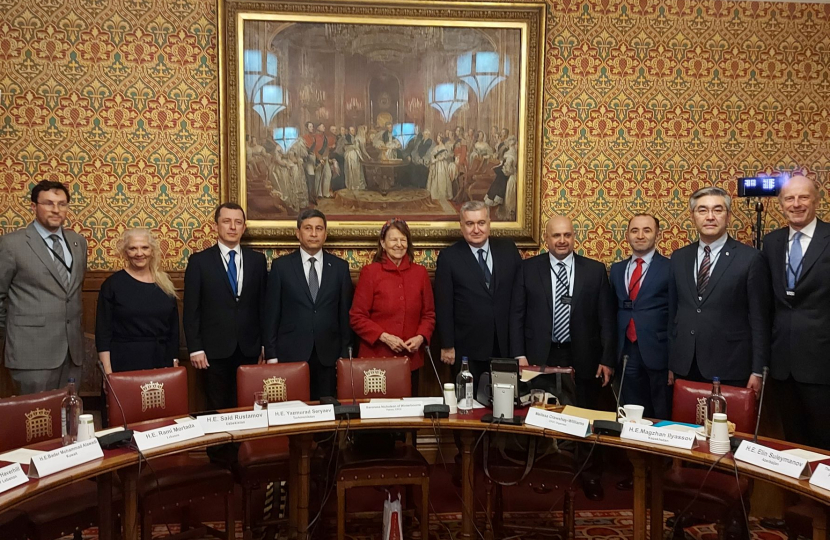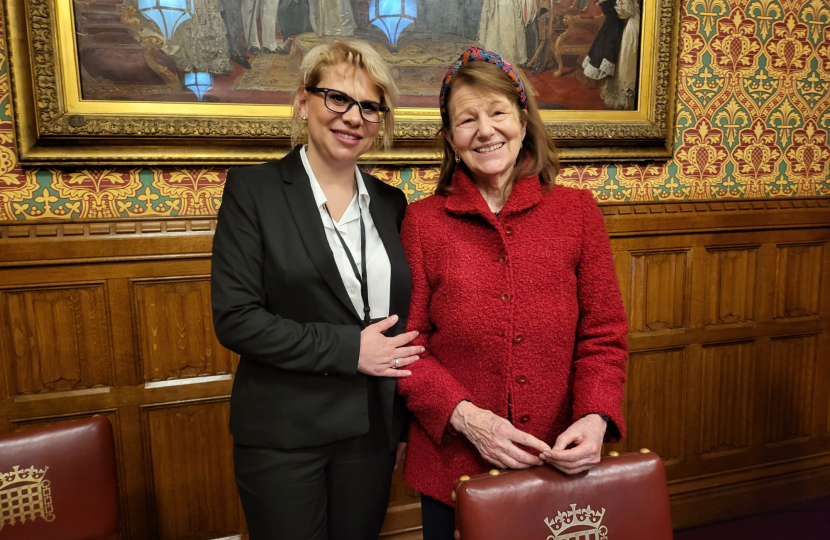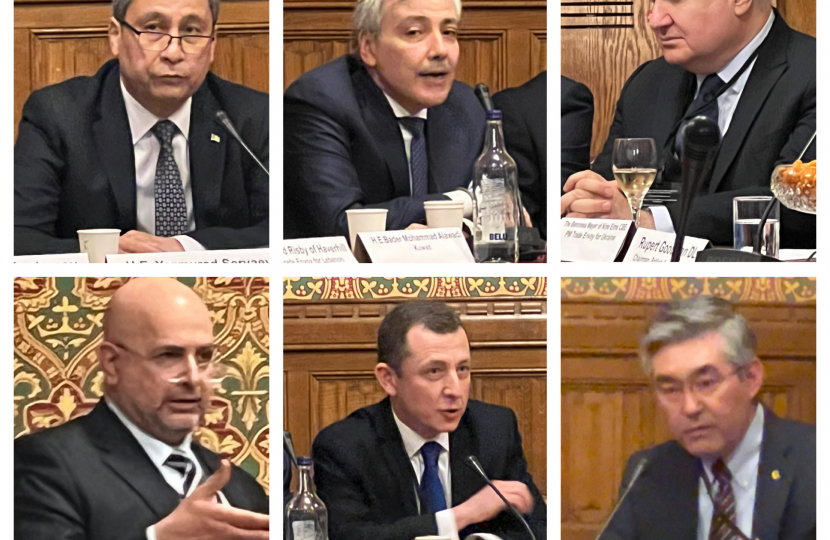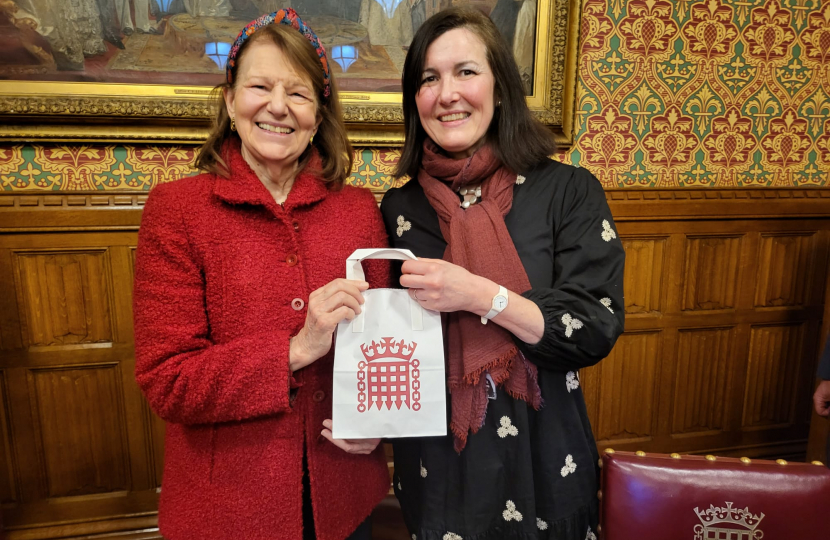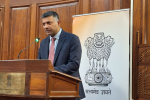‘Building bilateral Trade and Industry links’ Chaired by Baroness Nicholson of Winterbourne with Ambassadors of Turkmenistan, Lebanon, Kuwait, Azerbaijan, Kazakhstan, and Uzbekistan.
Panel Discussion with:
- Moldova Laura Banealite, First Secretary, Embassy of the Republic of Moldova
- The Lord Ranger CBE
- Christophe Michels, Managing Director, Iraq Britain Business Council
- Rupert Goodman DL, Chairman, British Kazakh Society
- The Baroness Meyer of Nine Elms CBE, PM Trade Envoy for Ukraine
- The Lord Risby of Haverhill, PM Trade Envoy for Lebanon
- Professor Victoria Lindsay, British Council Country Director for Iraq
Report of the event
A Meeting of the Conservative Foreign & Commonwealth Council took place on March 13th (being Commonwealth Day) at the House of Lords. Baroness Nicholson presided and welcomed the speakers. All of whom, being Ambassadors, were invited to discuss the building of the bilateral Trade and Industry links between the U.K. and their respective nations with an emphasis on higher education and the arts.
In the order of accreditation, the first speaker to be invited to address the very full room of FCC members was Ambassador Yazmurad Seryaev representing the Republic of Turkmenistan.
Ambassador Seryaev discussed the Economic Cooperation Agreement signed between Turkmenistan and the U.K. under which an ECGD facility for cover amounting to £2 bn had been entered into. He referred to the need for an increase in bilateral ties generally and education in particular. The importance of Economic cooperation was stressed for the financial services sector (banking and insurance), infrastructural improvements including the creation of smart cities and the need for joint ventures and technical assistance programmes . Textiles, chemicals and Petrochemicals are viewed as areas for growth.
Ambassador Rami Mortada of Lebanon spoke next. The U.K. and Lebanon have held multi-faceted trade relations for many years but they could be improved upon.
There are approximately 4,000 Lebanese students in the U.K. - a good prognosis. On a macro scale Anglo-Lebanese trade should be much greater than it is. Like the U.K, Lebanon is largely a service providing economy (70%) and it is an ideal back office hub offering complementary cooperation with the U.K’s financial services sector. An agreement with the IMF will enhance economic development for Lebanon in the long term and there will be opportunities in the off-shore sector for partnership. Ten blocks so far have been awarded, with eight to come.
Ambassador Said Rastimov from the Uzbekistan Embassy spoke next. He reflected on the vibrant history and importance of the Silk Route - the essential trade route between China and Europe which passed through Uzbekistan. Since the Uzbekistan economy opened up six years ago it has been growing significantly and the government expects Uzbekistan to become a middle income nation by 2030. A strong privatisation programme is underway, Free Trade Areas are being created encompassing some 6,000 free trade projects. A number of countries are taking advantage of the business possibilities that these provide, notably Germany, France and South Korea which are all well ahead of the U.K. which could do better. On a more positive note, the number of young Uzbeks winning scholarships to study in the U.K. is growing well.
Next to speak was Ambassador Elon Suleymanov of
Azerbaijan. He had good news to impart. The U.K. is Azerbaijan’s largest investor in essence on account of BP’s involvement in the highly important energy sector. Azerbaijan is doubling gas production in order to meet the energy needs of the U.K. and the EU. One only has to look at a map to note the strategic geographical positioning of the country bordering both Russia and Iran and supplying the energy needs of Georgia, Romania and Moldova. As well as the energy sector the Ambassador referred to the importance of an Agri investment.
The Ambassador for Kuwait, HE Bader Mohammed Alawadi referred to the 124 years of trade between Kuwait and the U.K. and to Kuwait’s Sovereign Wealth Fund (SWF), the Kuwait Investment Office, being the oldest SWF in the world and requiring no introduction in the U.K.. Important areas for investment are food security, technology and education, the U.K. - a powerful destination for Kuwaiti students.
Magzhan Ilyazov from Kazaksthan, being the most recent Ambassador to have been accredited to the Court of St James’s was the last to be introduced to speak.
Having just returned from her visit to Kazakhstan, Baroness Nicholson in her introduction referred to the close educational ties that are developing between Kazakhstan and the U.K. While in Kazakhstan she had visited De Montford University (one of two British Universities there) - an example of these growing educational ties. A further example of U.K. Kazakhstan bilateral ties has been the establishment of the Astana International Financial Centre (AIFC) in 2018. On this latter point, the Ambassador confirmed that there are eight U.K. judges present in Kazakhstan overseeing dispute resolutions. Education and Educational training are priorities. Mining activity (Rare Earth amongst others) is very important (Rio Tinto Zinc is there), Financial Free Trade centres (FEZs) are being established based on Dubai’s IFS model. In effect the opportunities are continuous as Central Asia interconnects with the huge geographical size of Kazakhstan at its hearth.
Baroness Nicholson then invited Laura Banelite First Secretary at the Moldovan embassy to speak who pointed out that U.K. is Moldova ‘s 8th largest trade partner. Moldova is seeking support for EU integration since it adjoins Ukraine and Romania. Whereas the U.K. is no longer involved in talks relating to the EU, bilateral dialogue with the U.K. is actively sought and two way trade developed.
A number of people were then invited to comment before the floor was opened up to general questions.
These were: Christophe Michels, the Managing Director of the Iraq- Britain Business Council, who stressed that living and working in Baghdad was very much calmer and safer than portrayed in the British Media. He referred to the creation of a British University in Baghdad, an important example of British soft power.
Rupert Goodman of the British Kazakh Society pointed out that U.K. trade had increased significantly and is now £2.2 billion and growing. He referred to the need for an intergovernmental commission to cover green energy, renewables and a mechanism to maximise soft power in developing Anglo-Kazan trade ties;
Professor Victoria Lindsay referred to the importance of building higher education in Iraq;
Lord Risby of Haverhill, Trade Envoy for the Lebanon, endorsed the need for the U.K. to do more there and
Lady Meyer of Nine Elms, Trade Envoy to Ukraine, touched on the strong support the U.K. is providing.
As it was Commonwealth Day, Baroness Nicholson praised to the role of the Commonwealth - a mutually supportive community of 56 independent and sovereign states established to achieve development, democracy and peace. This was very much the direction of the evening’s event.
Thanks were given to Melissa Crawshay-Williams for her enterprise in bringing such a range of countries together for a discussion on a very important topic. The full attendee list, Baroness Nicholson reminded the guest speakers, was made up of Conservative Party Members.

